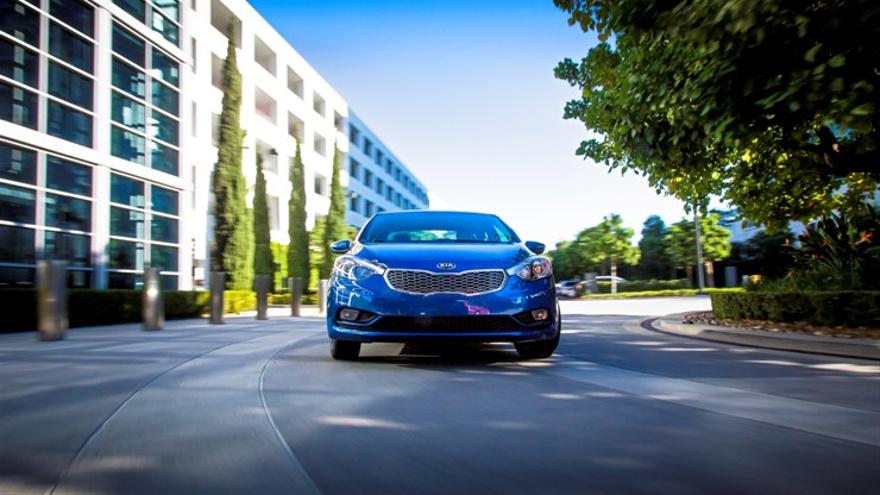Overbearing tech alerts could threaten adoption of fully automated vehicles

The Kia Forte won in the compact segment for the 2019 U.S. Tech Experience Index Study. Photo courtesy of automaker.
By subscribing, you agree to receive communications from Auto Remarketing and our partners in accordance with our Privacy Policy. We may share your information with select partners and sponsors who may contact you about their products and services. You may unsubscribe at any time.
COSTA MESA, Calif. –
Kristin Kolodge says alerts from vehicle technology such as lane-keeping and centering systems should not come across as a “nagging parent.”
“No one wants to be constantly told they aren’t driving correctly,” said Kolodge, who is executive director of driver interaction and human machine interface research at J.D. Power. “Automakers are spending lots of money on advanced technology development, but the constant alerts can confuse and frustrate drivers.”
According to the J.D. Power 2019 U.S. Tech Experience Index Study released on Tuesday, alerts from some advanced driver assistance systems annoy drivers so much that many of the drivers disable the systems. Some might try to avoid buying vehicles in the future that feature the systems, according to the study.
For automakers that have worked to market those “lucrative technologies” and hoped to see more highly automated vehicles in the future, that is a major concern, J.D. Power said.
This is the fourth year of the study, which measures owners’ experiences, use and interaction with 38 driver-centric vehicle technologies at 90 days of ownership. The study analyzed the following major technology categories: entertainment and connectivity; collision protection; comfort and convenience; driving assistance; smartphone mirroring; and navigation.
Collision protection scored highest at 813 among the six categories that the study measured. Second was smartphone mirroring at 789, and next were comfort and convenience (787); entertainment and connectivity (782); driving assistance (768); and navigation (744).
Subscribe to Auto Remarketing to stay informed and stay ahead.
By subscribing, you agree to receive communications from Auto Remarketing and our partners in accordance with our Privacy Policy. We may share your information with select partners and sponsors who may contact you about their products and services. You may unsubscribe at any time.
The study also honored some vehicle brands that Kolodge says “are succeeding at making their safety technology effective without being overbearing.” The Kia Stinger is the best-performing vehicle in the study, scoring 834 on a 1,000-point scale.
In addition to the Stinger winning in the compact luxury segment, the Hyundai Kona and Toyota C-HR tied with the highest score in the small segment. In the compact segment, the Kia Forte took top honors. The Chevrolet Blazer won in the midsize segment, Porsche Cayenne in the midsize luxury segment, and Ford Expedition in the large segment.
It was the second consecutive year that the Expedition, Kona and Stinger received segment awards.
Another key finding of the study is that 69% of respondents have Apple CarPlay, Android Auto, or both in their vehicles. J.D. Power said that is beginning to have a negative impact on future sales of the automakers’ factory-installed navigation systems.
Sixty-eight percent of owners with Apple CarPlay, Android Auto or both would like to have factory-installed navigation on their next vehicle. That compares to 72% of respondents who do not have Apple CarPlay or Android Auto.
“This is a significant future profit loss for the automakers,” J.D. Power said.
The study also finds that built-in apps are not meeting users’ expectations. The lowest-performing attribute in the entertainment and connectivity category, with 7.63 on a 10-point scale, is “ease of using built-in apps.”
Twenty-nine percent of owners have discontinued the use of built-in apps, according to J.D. Power, and 46% of those respondents say they “do not need it.” Eighteen percent say they “have another device that performs the function better.”
“Apps on external devices are a competitive threat, so it’s imperative for automakers to ensure intuitiveness and ease of use,” J.D. Power said.
The study also found that if an owner is satisfied with his or her vehicle technology experience, that strongly increases the chance that he or she will recommend or repurchase the brand.
When overall satisfaction scores higher than 900, 75% “definitely will” repurchase the same make again and 95% “definitely will” recommend it, according to the study.
“Automakers looking to drive loyalty need to provide a highly satisfying tech usage experience,” J.D. Power said.
For auto manufacturers, insurance carriers, telecommunications companies and consumer electronic companies, the study provides clarity on how to minimize the gap between driver experience and technology feature execution, J.D. Power said.
“Consumers are still very concerned about cars being able to drive themselves, and they want more information about these complex systems, as well as more channels to learn how to use them or how and why they kick in,” Kolodge said.
“If they can’t be sold on lane-keeping — a core technology of self-driving — are they going to accept fully automated vehicles? Dealers remain a partner in the process of helping translate to consumers what these technologies bring to the table, but consumers still need that element of trust that systems are going to kick in when they’re supposed to," she continued.
"It’s essential that the industry recognize the importance of an owner’s first experience with these lower-level automated technologies because this will help determine the future of adoption of fully automated vehicles," Kolodge went on to say.


